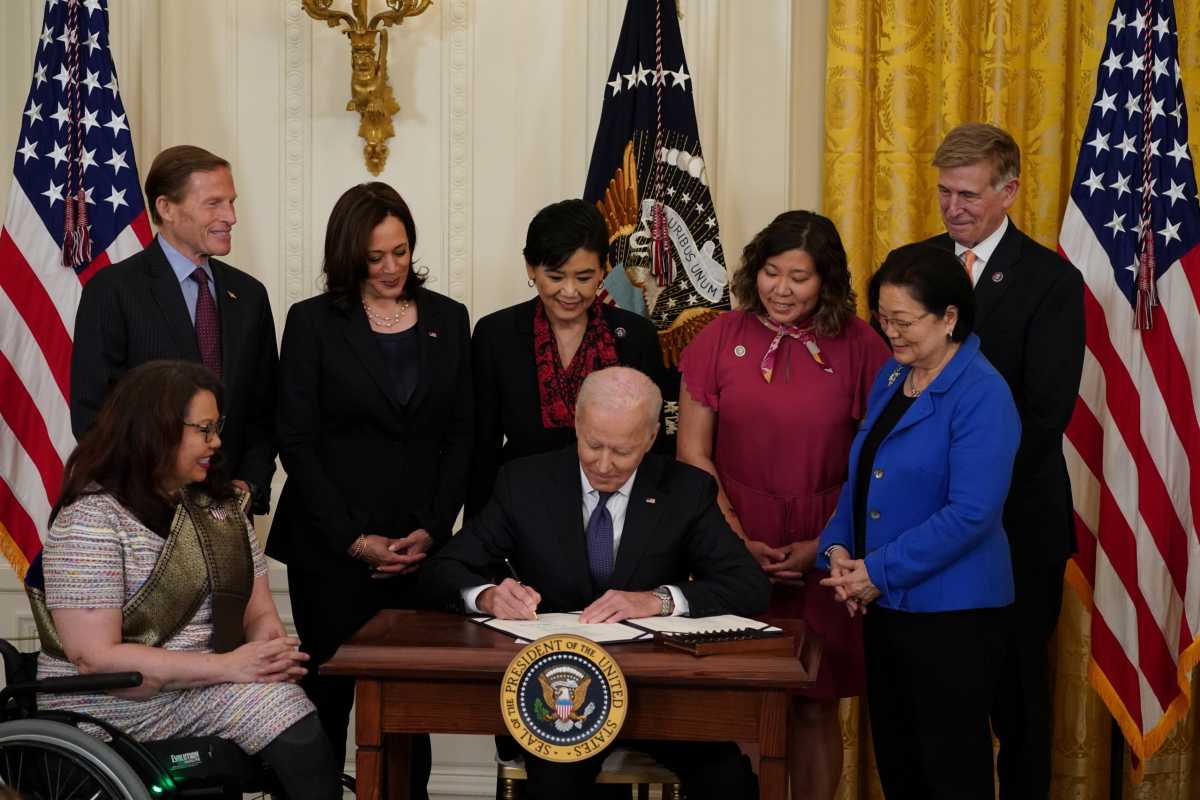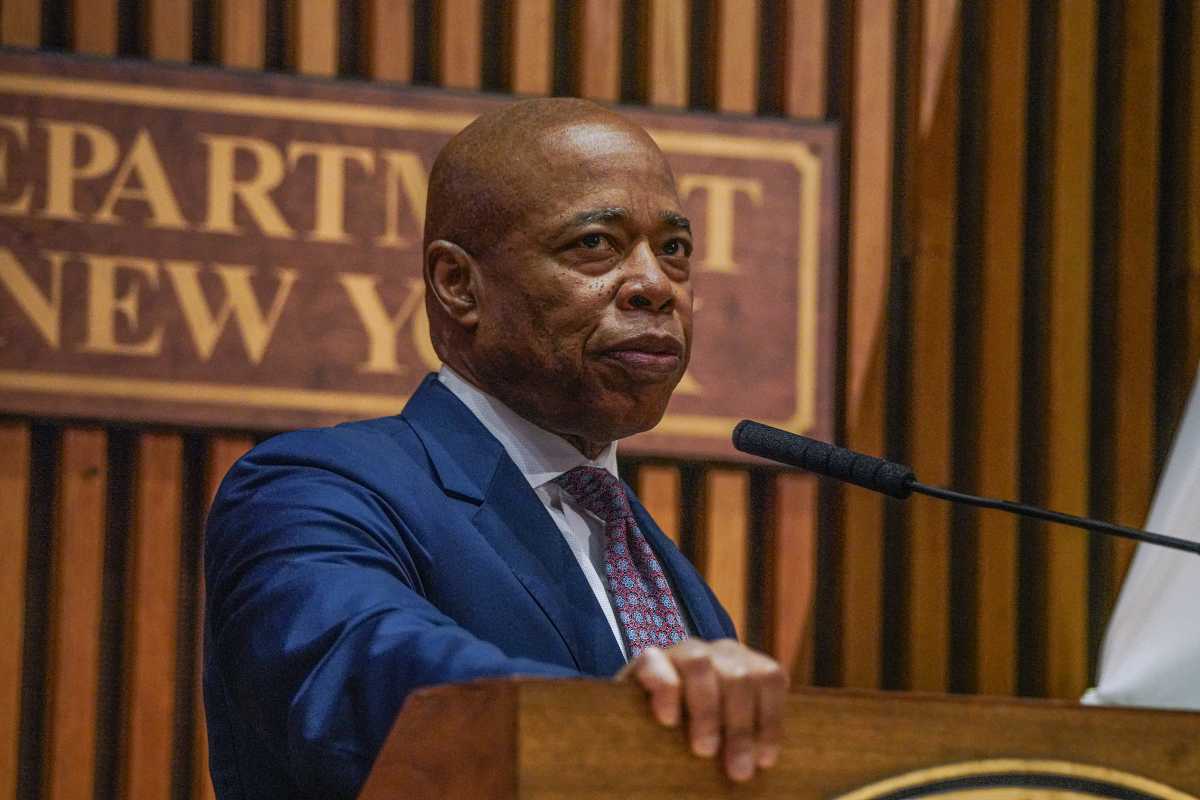President Joe Biden on Thursday, May 20, signed the COVID-19 Hate Crimes Act into law to help combat the rising hate and violence against Asian Americans during the pandemic.
In his speech, Biden thanked both Democrats and Republicans for passing the COVID-19 Hate Crimes Act, which received bipartisan support in Congress — something that hasn’t happened for far too long in Washington, Biden said. The president said he hopes the signing ceremony, which comes during Asian American and Pacific Islander (AAPI) Heritage Month, sends a message to the Asian American community: “We see you.”
“For centuries, Asian Americans, Native Hawaiians, Pacific Islanders, diverse and vibrant communities, have helped build this nation only to be often stepped over, forgotten or ignored,” Biden said. “My message to all of those who are hurting is, we see you. And the Congress has said, we see you. And we are committed to stop the hatred and the bias.”

Vice President Kamala Harris, the first woman and person of Asian descent to hold the office, thanked lawmakers for their work on the legislation.
“To the members of our United States Congress on both sides of the aisle who helped pass the COVID-19 Hate Crimes Act, thank you,” Harris said. “Because of you, history will remember this day and this moment when our nation took action to combat hate.”
The COVID-19 Hate Crimes Act will establish an office in the Department of Justice to facilitate an expedited review of COVID-19 hate crimes, encourage more reporting of incidents in multiple languages, and help make different communities feel more empowered to come forward and report incidents. It would also direct federal agencies to work with community-based organizations to raise awareness of hate crimes during the pandemic.
The bill, reintroduced by Queens Congresswoman Grace Meng and Senator Mazie Hirono (D-HI) in March, was passed in the House of Representatives on May 19 with a vote of 364-62 following last month’s approval in the Senate by a vote of 94 to 1. An enrollment ceremony was held on Capitol Hill following the passage of the bill in both chambers of Congress, which was printed on parchment paper and signed by House and Senate officials, and sent to the president for signature.
Truly heartened by the moment of the signing of her bill into law, Meng said she is “proud to have championed this issue of fighting for the safety of Asian Americans.” After the event, Meng was presented with a pen that the president used to sign her legislation.
“Earlier this week, I said that by passing my bill, Congress had the Asian American community’s back. Today, President Biden further demonstrated that he has backs of Asian Americans as well. I am incredibly grateful for the extraordinary leadership that the President has provided,” Meng said. “Since the beginning of his administration, he has made protecting the Asian American community a top priority; not just with words but with actions. He is a great friend and ally of the Asian American community and it has been an honor to partner with him to combat this problem. I thank him for having me by his side during this signing ceremony and for being such a strong and vocal supporter of my bill.”
As they commemorate the historic signing, Meng reflected on the pain and struggles of the past year and the fear and terror that the Asian American community has been forced to endure, and remembering those who have been impacted by the “heinous and racist attacks.” Stop AAPI Hate, a coalition of Asian American advocacy groups, recorded some 6,600 reports of racist violence against Asian Americans from March 2020 through March 2021. People reported being targeted with racial slurs, spat on and physically assaulted. Women made up nearly two-thirds of those who reported being attacked.
“For too long, Asian Americans have been seen as invisible and silent. We’ve often been viewed as foreigners and outsiders. But we are as American as anybody else in this country, and we will be invisible no more,” Meng said. “I remain hopeful that by continuing to work with the president, colleagues in government, leaders of other communities and so many other partners, we will stop Asian hate!”
The congresswoman noted that she is also pushing additional efforts to break down stereotypes and negative perceptions of Asian Americans including an initiative to promote the teaching of Asian Pacific American history in schools across the United States.
During the signing of the legislation, Queens lawmakers took to Twitter congratulating Meng on her achievement.
“The COVID-19 Hate Crimes Act is officially the law of the land. Because of @RepGraceMeng’s dedication and the leadership of our Asian American community, we’ve taken a massive step as a nation toward stopping Asian hate in its tracks,” Borough President Donovan Richards said.
The COVID-19 Hate Crimes Act is officially the law of the land. Because of @RepGraceMeng's dedication and the leadership of our Asian American community, we've taken a massive step as a nation toward stopping Asian hate in its tracks. #StopAsianHate @POTUShttps://t.co/YYIe3wL44A
— Queens Borough President Donovan Richards (@QnsBPRichards) May 20, 2021
Councilman Paul Vallone applauded Meng and many others for their work in passing the federal anti-Asian hate crime bill.
“This is an important step in stopping the wave of hate crimes that have plagued our community,” Vallone said.
https://twitter.com/PaulVallone/status/1395449857767354370
Councilman Barry Grodenchik wrote, “Congratulations to my friend and Congress Member @RepGraceMeng on passing and having @POTUS sign her legislation against hate. Great work.”
Congratulations to my friend and Congress Member @RepGraceMeng on passing and having @POTUS sign her legislation against hate. Great work. #StopAsianHate https://t.co/kF59Pz591i
— Barry Grodenchik🇺🇦 (@BarryGrodenchik) May 20, 2021




































